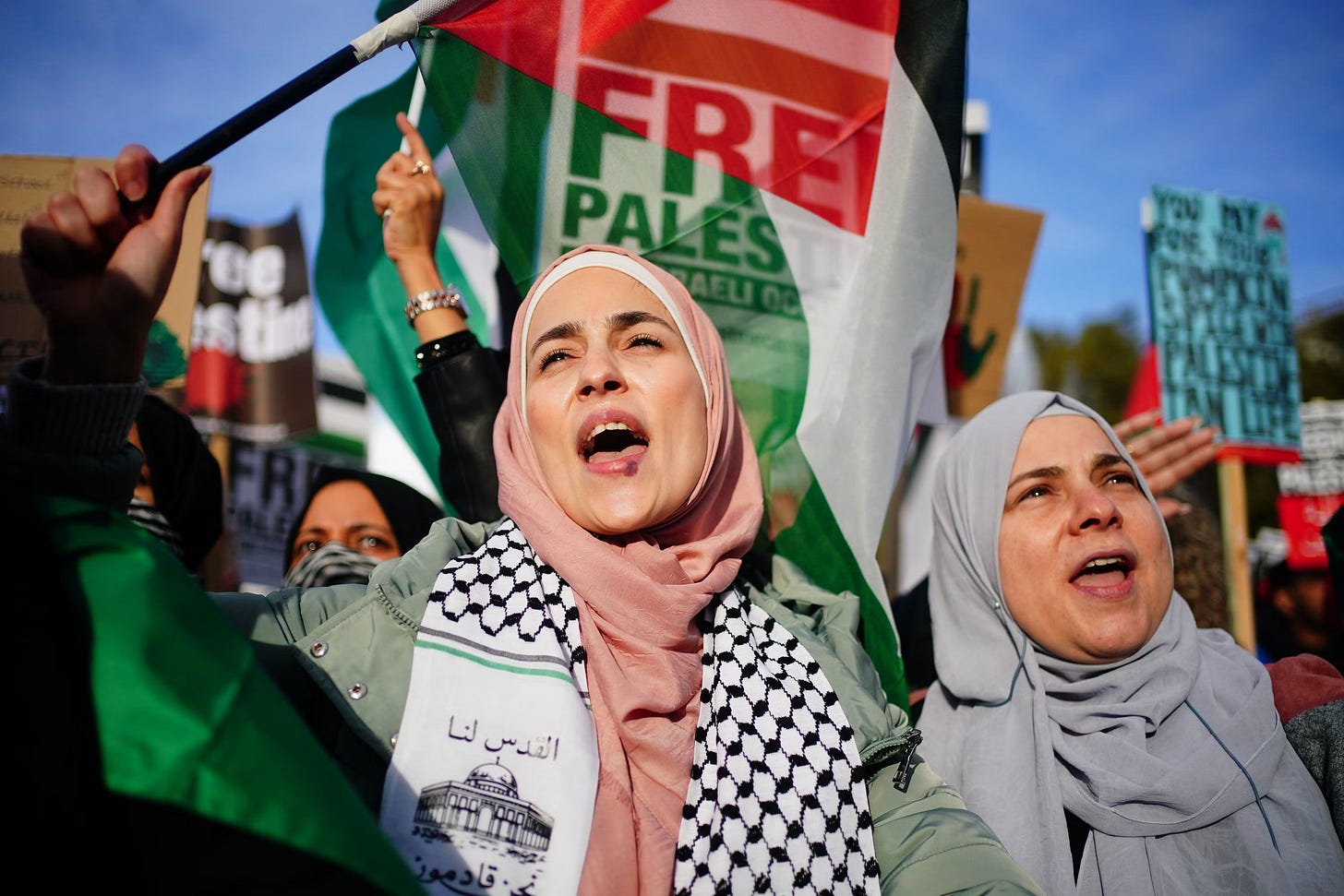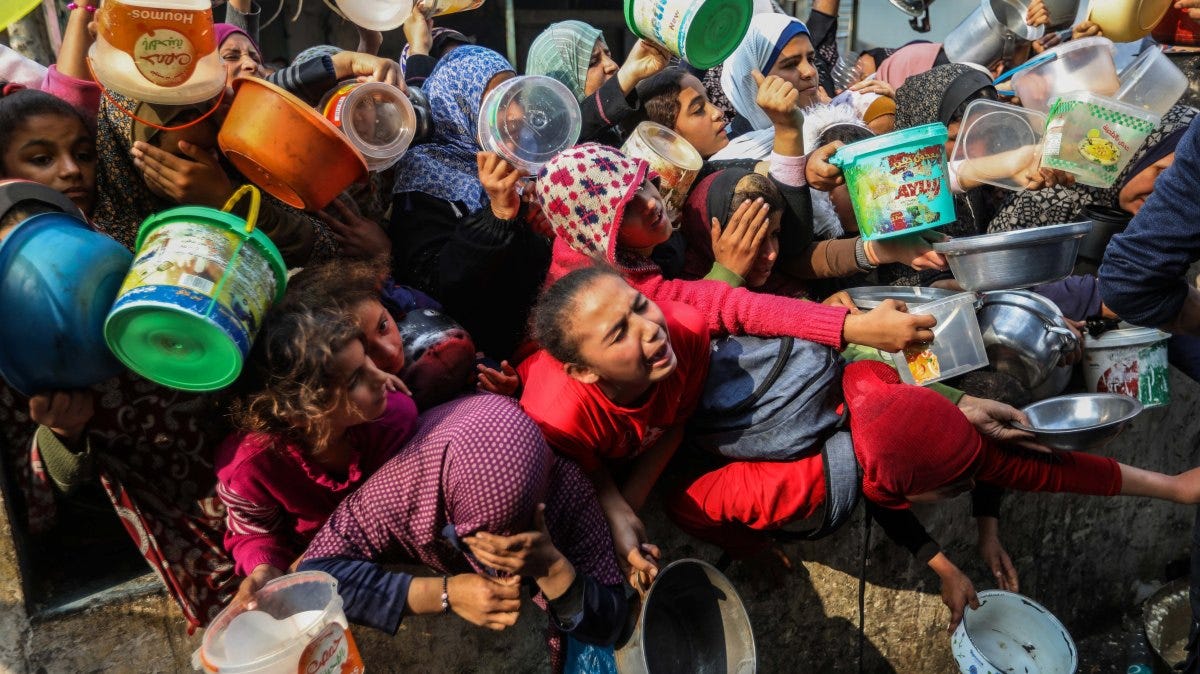Being Muslim American in the Time of Genocide
Gaza, the Existential Conflicts Within and Crises Without
“This is worse than after the Muslim Ban, than after 9/11,” uttered Abed Ayoub, a lawyer and childhood friend, four blocks away from the White House and two decades apart from the day that changed everything.
In between the prevailing custom of doom-scrolling and delivering bad news, Abed looked up with a stare that said everything. I knew that look well.
Like him, I’m an Arab, Muslim and American — an amalgam of identities that conjures up “pariah” in the world we live in. But now, it means something different. At this moment, when the horror of mass death unfolds in Gaza and on screens we hold in our palms, our identity spells absurdity.
This was on 7th day of the genocide that descended into Gaza. We are now at Day 92. Nearly three months and 30,000 deaths later.
We see ourselves in the people of Gaza. The accosted people there share our names, our faith, our culture and our customs. We have friends in that 140-square-mile open-air prison turned into hell on earth, including journalists who were sheltering at the Al-Ahli Baptist Hospital at the time of the deadly blast on Wednesday.
But what we continue to see on our screens is still half a world away. On the other side of our terrestrial reality and this virtual insanity.
But after several days into the genocide and fateful passages after and in between, this no long was the case.
“A Palestinian boy was killed in Illinois,” shared Abed. This sequence of foreign-to-domestic murder was a familiar one. Being American, like 6-year-old Wadea Al-Fayoume was, does not protect us from the stigma of being Palestinian or Arab, Muslim and from the “Middle East.” Rather, these latter identities keep the security blanket of Americanness away from us, rendering us foreign and, during times of crisis, “terrorists.”
Wadea was stabbed 26 times last Saturday with a military-style knife by his family’s landlord, a 71-year-old man who’s been charged with murder and hate crimes, among other crimes. The attacker also stabbed Wadea’s mother more than a dozen times. She lived. But what does that word even mean anymore?
What does it mean for a mother who escaped war for the safety of an American suburb? What does it mean for Abed and I: an executive director of a civil rights organization and a law professor, standing at the crosshairs of American power and an Arab identity conflated with terrorism? What does “living” mean for millions of Arabs and Muslims who call the United States home, burdened with the impossible task of proving their allegiance, over and over again, in response to bellowing demands that bury our humanity?
It feels like we are living on borrowed time, like we were extended a contingent citizenship that can be stripped at any time, on account of events that unfold in America or on the other side of the world.
Weeks later, three Palestinian college students were shot for wearing the keffiyeh. This garment, worn as a symbol of resistance, is widely stereotyped as a market of terrorism in the minds of bigots - including the man who shot the three young men.
The students lived. However, one was left permanently paralyzed, his life forever turned around and changed by a hate crime spurred on by a vile blur of anti-Palestinian hate and Islamophobia.
Calling it “Islamophobia” would be a severe understatement. This existential ballad of being Arab or Muslim in America is far more onerous, far more absurd. It feels like an existence that has no exit. A play where our daily routine is waking up to the news of war, the stark images and videos of slain children, rolling timelines of shattered villages and the roaring demands “to condemn Hamas.” While this plot sounds a lot like novels from Jean Paul Sartre or Albert Camus, this is not fiction.
This is our absurd reality.
An absurd reality where we, in America, can only post on virtual timelines where the footsteps of suspicion stomp out our voices and censor our speech.
Our names and nationalities, faces and faith brand us with the stain of collective guilt for crimes that we did not commit. Moments like this — like the aftermath of 9/11 or the reckoning after former President Donald Trump’s Muslim Ban in 2017 — moved many to conceal their ethnicity or cover their faith, particularly women who removed their hijabs or young children who hid behind aliases.
Hate crimes statistics skyrocketed after 9/11, and reached near proportions in the wake of the Muslim Ban. Wadea’s death foreshadows that these figures may spike again, and descend on the heads of Arab and Muslim Americans shadowed by suspicion.
But we cannot shed our bodies. These are the corporal vehicles that connect us to the victims cast as villains in Gaza. And the symbols that tie us to distant places where “wars on terror” were wrought yesterday and are certain to wreck more lives tomorrow.
Even acts of protest have been punished. Off and online, whereby students have been doxxed, doctors have lost their jobs, and everyday Muslims laid off or terminated for innocuous social media posts calling for a ceasefire or opposing a genocide.
American citizenship, and the theoretical rights that emanate from it, have not protected Muslims exercising their right to free speech and assembly. And when they do, the more that they do, the bigger the target grows on their back and head.
“Muslims are only newsworthy when villains, never victims.” I wrote those words, for the first time, as a law student weeks after the 9/11 terror attacks. I was much younger then, unprepared for what the world would come to be.
But I knew then that it would never be the same.
I typed those very eight words 20 years later in my book, “The New Crusades: Islamophobia and the Global War on Muslims.” In between the wide-eyed optimism of a young law student and the sobered worldview of an aging law professor, 9/11 and today’s war serve as bookends for morbid middle passages for Muslims in America and around the globe – as evidenced by the genocidal campaigns in China, persecution in India, hijab and abaya bans in France, and far more. The law and language of Islamophobia have been exported transnationally by an American “war on terror” that was first enforced on the home front, upon the heads of Arabs and Muslims like me whose citizenship was cast aside.
Being American was no protection. Not then and definitely not now.
The barrage of cold stares and commands to condemn terrorism, assignment of collective guilt and characterization of our dead children as “collateral damage,” not only strips us from the substance of citizenship, it renders us inhuman. “People don’t have ideas,” wrote Carl Jung, “Ideas have people.”
And the idea that conflates our skin with terrorism not only grips the imagination of people, but sinks into the very marrow of American gates of power. We must exist, whatever that even means anymore, within the very lines that divide our identities and sever us from normalcy.
While I am in Phoenix and not Chicago, I can feel every one of those 26 stabs that plunged into little Wadea’s body. While across American cities large and small, we see ourselves in the grieving parents forced to bury their dead children in Gaza.
This is what it means to be us.
Perhaps it is time that this country begins to see us.
Khaled A. Beydoun is a law professor and author. He publishes his daily insights online at @khaledbeydoun. This article was originally published in CNN.








This was the most powerful thing I've read from you Khaled. Even as a white facing male in the west, I was never white enough nor black enough for anyone's liking growing up. But the persecution and injustice that Muslims face on a daily basis makes my little issue just that, little. I can't imagine the stress and strain on just your mental wellbeing that this takes. Thank you as always for sharing with us, educating us, and opening our eyes to the changes the world needs for the betterment of human kind!
Professor, the answer is Christian Zionism and evangelism. All roads lead to evangelism.
As a Palestinian-American Muslim who lived his whole life and grew up in the U.S., I relate to every word. Thank you for sharing this.
The driving force behind the demonization of Muslims (at least in America) is evangelism. Islam has been labeled as a “death cult” that is “hellbent on world domination and enforcing its political will on the world through violence.” I never really thought of it this way until now: isn’t this projecting? Is this not exactly what Christian evangelism stands for? What does a White middle-aged man thousands of miles away from my homeland, or as this man will call it, “the holy land”, have to do anything with my home and my people? It is because he is indoctrinated from a very young age that he must aid and enable the effort to help all Jews move into the “holy land” so that the rapture prophecy can be fulfilled and Jesus can finally come down to earth and levitate him and the rest of the believers to heaven, at whatever cost, even at the heavy cost of Palestinian children, who in his view are cannon fodder or collateral damage; just human beings who were unlucky enough to have been born Palestinian. Isn’t this exactly what the Western world has always accused Islam of representing? The only religion, and followers of said religion that are actively enforcing their political will on the entire world based on their stone-age scripture is… yup, you guessed it, evangelical Christianity. So, why is it that evangelical Christians not only have dreams of crusades and the rapture prophecy to be fulfilled in their lifetime, but they are also ACTIVELY WORKING on it and actively traveling to join the Israeli army in its mission to ethnically cleanse Palestinians in Gaza, yet in contrast, Muslims living in these oppressed countries of the Middle East are immediately labeled as terrorists for rising up to defend their homeland, or even if they don't, they are labeled as terrorists by association of the religion? Why is it that the U.S. (and much of the western world) claims, and prides itself, on being secular and inclusive, yet its supreme leaders are fanatical evangelicals who dream of imperialist grandeur, crusades and rapture? When will the world start exposing the extreme and violent, yet taboo, nature of evangelism?
From my observations, Islamophobia stems mainly from the efforts of an evangelical-led propaganda machine that is hellbent on demonizing Muslims. 9/11 certainly made the work of this propaganda machine so much easier. Every single sane Muslim, surely the ones that I knew and grew up with, denounced the terror attacks of 9/11. Terror is never justified and never will be. But we also must not be naive to think that any terror attack happens in a vacuum. The current genocide and ethnic cleansing in Gaza will surely create ideal conditions for incubating terror cells around the world. And what will the world do then other than blame it again and again on Muslims, instead of finally facing up the hard and naked truth: religious fanaticism is the root of all evil. And no, it’s not Muslims that are waging Jihad, it’s the crusaders all over again.